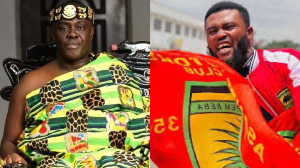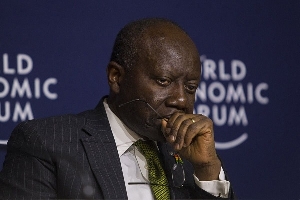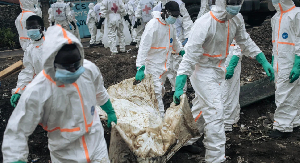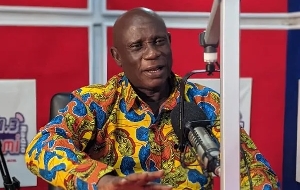The Centre for Democratic Development (CDD-Ghana) has waded into the debate over the 998 list of staffers working at the presidency.
CDD-Ghana in a statement called on parliament to demand for further details so Ghanaians will be informed on the specific roles for the individuals listed.
According to the civil society group, the staggering number is “deeply worrying” taking into consideration the burden it puts on the national purse.
It is therefore calling on Parliament and the Council of State to be proactive to put checks on the presidency. “The Center is especially disappointed at the President’s decision to continue this trend of overstaffing at the Presidency, given the public concerns raised over his appointment last year of 110 Ministers and Deputy Ministers.’’
“CDD-Ghana is also disappointed that neither the Council of State nor Parliament has seen fit to rein in this growing indifference of successive administrations to the fiscal cost of a super-sized presidential staff and retinue.
Although the role of the Council of State in the staffing of the Presidency is, under the applicable statute, only consultative, the point of inserting the Council in the process is presumably to enable it counsel the President in its staffing decisions, including, we would expect, in the size, where it appears excessive.”
Below is the full statement:
CDD-GHANA CALLS FOR ACTION AGAINST GROWING SUPER-SIZED PRESIDENTIAL STAFF AND RETINUE
The publication last week of the list of presidential staffers for 2017 submitted to Parliament has revived the intense public debate over the size of government. The 2017 list shows a total of 998 persons employed at the Presidency.
The Ghana Center for Democratic Development (CDD-Ghana) has taken due cognizance of the fact that the published list covers both civil/public servants and presidential appointees serving under various designations at the Presidency.
Nonetheless, the Center finds the trend towards locating or attaching a large number of workers and staffers to the presidency deeply worrying.
The Center is especially disappointed at the President’s decision to continue this trend of overstaffing at the Presidency, given the public concerns raised over his appointment last year of 110 Ministers and Deputy Ministers.
CDD-Ghana is also disappointed that neither the Council of State nor Parliament has seen fit to rein in this growing indifference of successive administrations to the fiscal cost of a super-sized presidential staff and retinue.
Although the role of the Council of State in the staffing of the Presidency is, under the applicable statute, only consultative, the point of inserting the Council in the process is presumably to enable it counsel the President in its staffing decisions, including, we would expect, in the size, where it appears excessive.
Similarly, the point of statutorily requiring the President to submit a list of the employees at the Presidency to the Parliament on an annual basis is not merely for the sake of informing Parliament but to enable Parliament, on the basis of that information, to raise any appropriate questions and concerns it might have over staffing with the Presidency.
This is an especially important role for Parliament, as staffing numbers have direct fiscal implications. CDD-Ghana finds unpersuasive the defense that the listed presidential office personnel all play different and necessary roles at the Presidency.
In the case of the civil service personnel, it is not clear why many of the agencies for which they presumably work must be located at the Presidency. A good number are functionally best situated within one or the other existing Ministry or Department.
In some other cases, it is not at all clear why those agencies must continue to exist. With regard to the political staffers, one notices from the list a large number of personnel with vaguely defined and unclear roles as well as many instances of a duplication of roles.
Not only does this tend to undermine efficiency and discipline in the running of the Presidency, it also undermines the credibility of the President’s pledge to protect the public purse by ensuring judicious use of scarce state resources.
With the President championing a ‘Ghana Beyond Aid’ agenda, a vision many Ghanaians appear to have embraced, there is widespread expectation that the Presidency would lead the way toward that noble goal by signaling through its conduct an end to profligacy and an exceptional commitment to economy in the expenditure of public resources.
CDD-Ghana is equally unpersuaded by the argument that the size of the President’s political staff is justified because the President has a big agenda to push through. We do not believe that the size of a party’s or president’s election manifesto must necessarily determine the size of its government.
Such a proposition, if accepted, would lead us down an untenable path, as parties and presidential candidates would be motivated to outdo one another in a “manifesto war” and, then, once elected, proceed to justify their super-sized staffs as necessary to prosecute their grand manifestos.
CDD-Ghana believes that, for effective governance and long-term development, including continuity in implementation of government programs and programmes, what the country needs, and what successive governments must invest in, is not more and more short-lived partisan appointees at the Presidency but a strong, capable, well-staffed, efficient, and disciplined civil service, at both the national and subnational levels.
Omitting to rebuild the capacity of our weak civil service and choosing, instead, to place reliance on party cadres is not in the ultimate best interest of the country, as it over-politicizes the business of government and demoralizes and further weakens the capacity of the public administration.
In light of the foregoing, CDD-Ghana urges:
Parliament, in the immediate term, to review the list submitted by the Presidency and demand additional information and clarity as to the precise roles and duties of the many political personnel listed with uninformative and vague job titles as well as require a disclosure of the salaries and emoluments attached to the listed positions.
In the medium to long term, Parliament must review the Presidential Office Act, along with the Civil Service Act (as amended), with a view to depopulating the Presidency of the many needless agencies that currently fall within its organogram. •
The Council of State to take its consultative role seriously and counsel the President appropriately concerning overstaffing at the Presidency, including the associated fiscal costs and the unfavourable perception it creates of profligacy in the conduct of the business of government at the seat of the presidency.

















